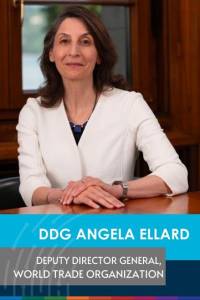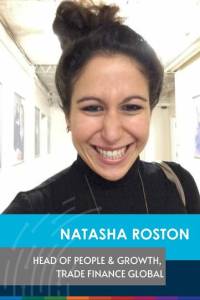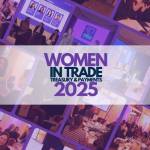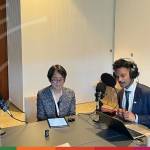Women in Trade 2023
Content
Celebrating International Women’s Day 2023
The theme of International Women’s Day 2023 is #EmbraceEquity. We can all truly embrace equity. Equity is about creating an inclusive world. As a society, it is vital that we accept, adopt, and champion gender equity across all facets of life, including wellbeing, employment, technology, sport, and social leadership. Equity is the practice of ensuring fair treatment, equal opportunities, and equal access for all people. An essential component of equity is the acknowledgement that certain advantages and barriers exist and that these barriers have prevented women from involvement and advancement in many areas.
Our campaign recognises that certain advantages and barriers exist that have prevented women from involvement and advancements in many areas. This year’s campaign pushes allies to enhance the social, economic, cultural, and political advancement of women. The goal is equality, and equity is the way to get there. Let’s face it, equity is not just a nice-to-have, it’s essential. And the best part? We can all be a part of it.
As we celebrate International Women’s Day 2023, we’ll be highlighting the careers, experiences, and achievements of women in international trade, treasury, and payments. It is time to see women break down barriers and excel in fields that were once male-dominated.
The gender gap in trade, treasury, and payments is a significant issue that needs to be addressed. Women are still underrepresented in these industries, which has resulted in unequal opportunities for them. Despite significant progress in gender equality in recent years, many women still face barriers that prevent them from achieving success in their careers.
This campaign’s aim is to celebrate women and their successes in the industry that can help overcome the gender gap. By highlighting the achievements of women, we can inspire other women to pursue careers in trade, treasury, or payments and show that it is possible to succeed.
Ultimately, the key to overcoming the gender gap is to create a culture that values diversity and inclusivity. We need to recognise the valuable contributions that women can make in this industry and ensure that they are given equal opportunities to succeed.
DDG Angela Ellard, World Trade Organization

The global economy is not gender-neutral.
It is estimated that women represent 39% of the global workforce, and their earnings are on average between 10% and 30% lower than those of men. In addition, women spend two to ten times more time on unpaid household work, and this burden increased significantly during the COVID-19 pandemic. Moreover, the pandemic has had a disproportionately adverse effect on women’s labour market outcomes. Women lost more than 64 million jobs in 2020, a 5% loss, compared to a 3.9% loss for men.
Trade is also not gender-neutral.
There is evidence that women face higher obstacles than men in accessing the global market and the economic opportunities created by trade. Women entrepreneurs face higher trade costs than men, which prevents them from trading internationally. In particular, women face greater barriers to finance, higher costs of doing business, and more limited access to information and markets. Such structural challenges in the global economy prevent women from fully reaping the benefits of trade. As a result, only 1 in 5 female-owned small businesses is exporting.
Trade has also been instrumental in providing women with job opportunities in the formal sector in developing countries, significantly reducing participation in the informal sector and its more insecure working conditions. According to our research, women are more likely to work informally in sectors with low levels of exports.
Given that the global economy and commerce are structurally not gender-neutral, rules governing international trade should be designed to reach gender-neutrality.
Today, we no longer think about international trade purely in terms of market opening and tariff reduction. Instead, we also want trade to be a source of virtue, and we want to use its power to assist those who may not have fully benefitted from economic globalization before — for example, women, indigenous peoples, and persons with disability. This is in line with the objectives of raising standards of living, ensuring full employment, and sustainable development, all enshrined in the preamble to the WTO Marrakesh Agreement. Making trade more inclusive by supporting the integration of women in international trade is at the heart of our work at the World Trade Organization.
Read DDG Ellard’s full speech, delivered at Trade Finance Global’s event for International Women’s Day 2023: DDG Ellard – We need to make trade work for women →
Natasha Roston, Trade Finance Global

132 years is too long to wait
Let’s go back in time for a moment. The year is 1891. Britain was an Empire. Russia was under Tsarist rule. China was under the rule of the Qing Dynasty. The US was on their 23rd president, a Republican.
It was a year of global change and upheaval, as the world grappled with the challenges of modernisation post industrial revolution, political reform, and social transformation.
It was still two years until the first country, New Zealand, granted women the right to vote in national elections.
It would be another 29 years until women’s suffrage was achieved in the United States, and 8 years after that for all women in the UK to be granted equal voting rights to men. The timeline of countries goes on and on.
Although many countries granted women the right to vote, they were still discriminated against and faced barriers to political participation and representation, limited access to education, economic opportunities, social and cultural bias.
Context is important but why the history lesson? The issue is, it’s not really HIStory. Firstly, it’s HERstory, but secondly, it’s still very much the present. Yes there has been progress… but not enough.
That was 132 years ago. And according to the latest World Economic Forum report – at the current rate of progress, it will take exactly that length of time in the future for the global gender gap to reach full parity. 132 years.
I very much hope, that if we all #EmbraceEquity together, we can achieve this much sooner. We have to.
What does #EmbraceEquity mean for me as a woman in trade?
Firstly, it is about us – all of us. Not just 50% of the population, but the whole population.
Time to get men more involved. Time to empower women to speak out – to tell their stories.
That is what this campaign is all about. We all need to show up, to stand up. That’s on all of us. Gender equality is number five on the United Nations Sustainable Development Goals for a reason. When women succeed, the world succeeds – and we will never achieve female equality until we have gender equity.
For so long female voices have been silenced or suppressed. Let’s make a conscious effort to ensure that is no longer representative of today. Make sure you are listening to HERstories.These stories may be micro in terms of personal career journeys and the barriers women face in the workplace, or macro, on the global impact of trade on female economic empowerment. Both are equally on the agenda, and important for the progress of women’s equity.
In the workplace – research speaks volumes. According to a House of Commons briefing last December, the pay gap in the UK is largest in the financial and insurance industry. Internationally, in 2021, women held only 21% of board seats, 19% of C-suite roles, and 5% of CEO positions in financial institutions. It’s time to change these stats.
On the global arena – we all know that trade plays a hugely important role in promoting economic empowerment for women; employment, independence, access to finance, safety…the list goes on. So it is important to consider trade policies and practices from a gender lens in order to achieve equitable and inclusive trade.
I am thrilled to help lead this momentous campaign – and more than that – honoured to be a part of this amazing community of Women In Trade, Treasury, and Payments. Thank you all for choosing to #EmbraceEquity.
Sponsors & Partners
Learn MoreMore about Women in Trade
- WITTP Over The Years
- Topics
- Podcasts
- Videos



























